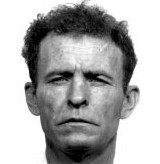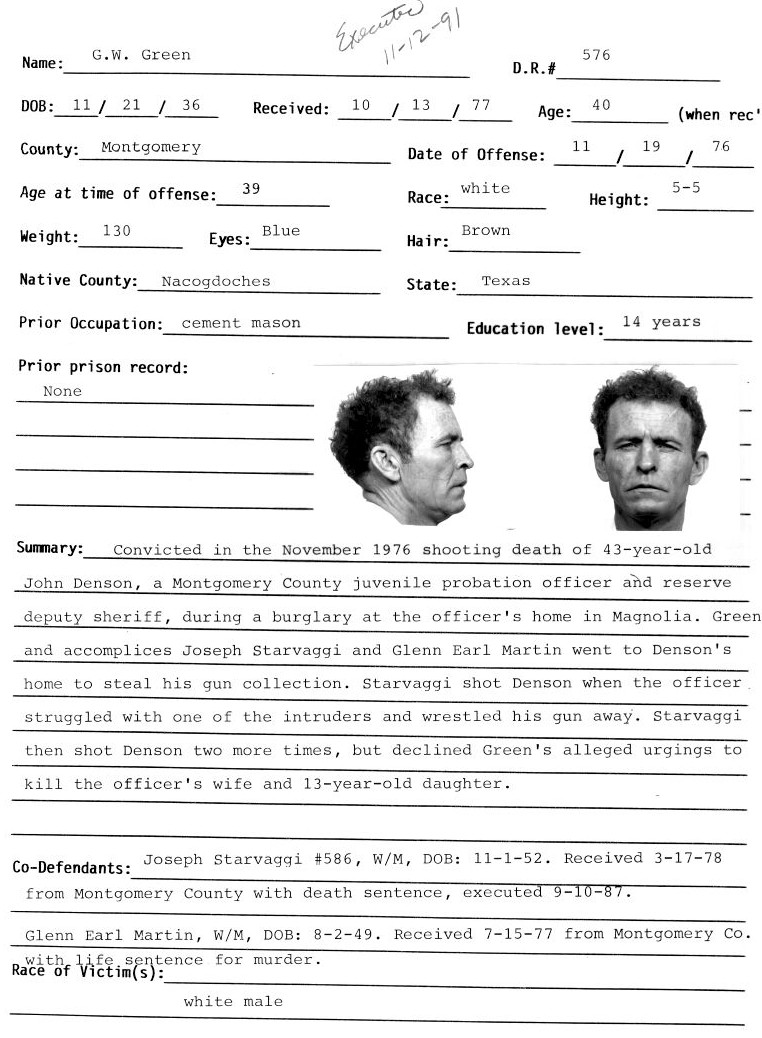One of three gunmen who broke into a house 15 years ago, terrorized a family and then killed the father was executed by injection at the state prison here early today.
The 54-year-old prisoner, G. W. Green, was put to death seven hours after the United States Supreme Court refused, on a vote of 7 to 2, to grant him a stay based on his argument of ineffective assistance of counsel.
Green, strapped to a gurney in the death chamber, greeted his brother, a sister and a friend who had arrived to witness the execution, expressed his love and then told the warden, Jack Pursley: "Lock and load. Let's do it, man."
As lethal drugs flowed into his arms, he used an obscenity to describe life, gasped once and made no further movement. He was pronounced dead at 12:17 A.M., seven minutes after the drugs began flowing.
Mr. Green's brother, Bobby, growled at state officials as he left the death chamber, "Hope you all are happy."
Expressing No Remorse
Mr. Green had refused recent requests for interviews. In earlier conversations, however, he had expressed no remorse. "I have no apologies, no mercy to ask," he said. "I'll never tell someone I'm sorry for something I didn't commit."
That was a reference to the fact that it was not Mr. Green who fatally shot John Denson, a 43-year-old part-time probation officer. But Texas law provides that any participant in a crime that proves fatal to the victim may be put to death.
Mr. Green and two accomplices invaded Mr. Denson's house in 1976 to steal a $6,000 gun collection. They forced Mr. Denson's wife and 12-year-old daughter to lie under a blanket while Mr. Denson begged for his life and then was shot by another of the gunmen, Joseph Starvaggi.
Mr. Denson's wife, Grace, said later that Mr. Green had screamed at Mr. Starvaggi to kill her and her daughter but that Mr. Starvaggi had refused.
Mr. Starvaggi was executed on Sept. 10, 1987. The third gunman, Glen Earl Martin, is serving a life prison term.
A Daughter's Bitterness
In an interview today, Mr. Denson's daughter, Susan, now 27, expressed bitterness about the length of the appeals process.
"That night, in 15 minutes, my father lost his life," she said. "Here it is now, almost 15 years later. There's definitely a problem with that. I have respect for the justice system, but there are problems that haven't been dealt with correctly. There's nothing to put the fear of God in anybody."
947 F.2d 1230
G.W. GREEN,
Petitioner-Appellant,
v.
James A. COLLINS, Director,
Institutional Division Texas
Department of Criminal Justice,
Respondent-Appellee.
No. 91-6203.
United States Court
of Appeals,
Fifth Circuit.
Nov. 9, 1991.
Appeal From the United States District Court for the Southern District of Texas.
Before POLITZ, HIGGINBOTHAM, and BARKSDALE, Circuit Judges.
PER CURIAM:
I.
G.W. Green requests a stay of execution of his death sentence imposed by a Texas jury, a certificate of probable cause to enable him to appeal the district court's denial of application of writ of habeas corpus and stay of execution, and appointment of counsel. Green is scheduled for execution on November 12, 1991, after midnight and before sunrise. This is Green's first federal habeas corpus review in this court. On September 25, 1991, his two state habeas petitions were denied. On October 2, 1991, his execution was scheduled for November 12, 1991. However, his federal habeas petition was not filed until November 6, 1991. He presented seven issues to the district court in his original petition:
1. The jury could not give expression to his mitigating evidence as required by Penry v. Lynaugh, 492 U.S. 302, 109 S.Ct. 2934, 106 L.Ed.2d 256 (1989).
2. Green was denied effective assistance of counsel in five particulars: counsel failed to interview and call all witnesses essential to his contention that his confession was coerced and involuntary; counsel failed to properly pursue a claim of indigency in support of a court-appointed investigator, handwriting expert, and independent psychiatrist for evaluation; counsel failed to obtain rulings on certain pretrial rulings; counsel failed to preserve any error of the trial court in not placing the full confession of Green's co-defendant before the jury; and, finally, counsel failed to make certain evidentiary objections.
3. There was no finding by the state courts as required by Enmund v. Florida, 458 U.S. 782, 102 S.Ct. 3368, 73 L.Ed.2d 1140 (1982).
4. Green was deprived of rights secured by the fifth and fourteenth amendments by certain interrogation techniques of the state.
5. The fact-finding procedures in state habeas were inadequate.
6. Under Texas law, neither the state trial court nor the Texas Court of Criminal Appeals were authorized to issue findings of fact.
7. The federal district court failed to conduct a required evidentiary hearing.
Petitioner moved in district court for reconsideration of the court's ruling that the state had furnished a psychiatrist. In the motion for reconsideration, Green urged that the appointed psychiatrist considered only competency to stand trial and not legal insanity. Green argues that the denial violated Ake v. Oklahoma, 470 U.S. 68, 105 S.Ct. 1087, 84 L.Ed.2d 53 (1985). The district court denied the petition for reconsideration, concluding that the state granted the only request made by Green.
II.
We deny the request for stay of execution, and decline to issue a certificate of probable cause. We do so for essentially the reasons stated in the district court's order filed November 8, 1991, and its order denying the petition for rehearing also entered on November 8, 1991, with three exceptions. First, we agree that petitioner has no colorable claim of a Penry violation. We reach that conclusion for reasons other than those stated by the district court. Specifically, we do not rest upon the district court's analysis under Boyde v. California, 494 U.S. 370, 110 S.Ct. 1190, 108 L.Ed.2d 316 (1990). Rather, we are persuaded that the jury could give expression to all of Green's evidence in mitigation in answering the question of future dangerousness or deliberate acts, or both.
Second, we also reject the Enmund claim for reasons other than those relied upon by the district court. Enmund requires a state determination of the requisite participation by an accused. The jury's answer to the question in the sentencing phase of whether Green acted deliberately meets the Enmund requirement.
Third, we agree with the district court's rejection of Green's claim that Texas denied him appointment of a psychiatrist in violation of Ake v. Oklahoma, 470 U.S. 68, 105 S.Ct. 1087, 84 L.Ed.2d 53 (1985), but we emphasize a different reason. Green has never made the "preliminary showing that his sanity at the time of the offense was likely to be a significant factor at trial." Id., 105 S.Ct. at 1091.
Finally, we note that the motion for appointment of counsel in fact requests either a substitution of counsel or the addition of counsel who have been informally assisting the court appointed counsel. Petitioner has at all times been represented by either retained or appointed counsel. We find no reason to disturb the ruling of the district court.
III.
We observe that although this death sentence was given by the jury more than 14 years ago, this is petitioner's first federal habeas review by this court, as earlier noted. The application for a stay of execution and a certificate of probable cause is DENIED.


